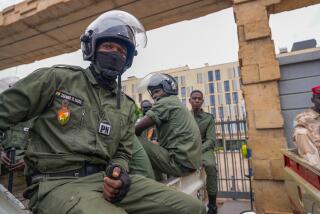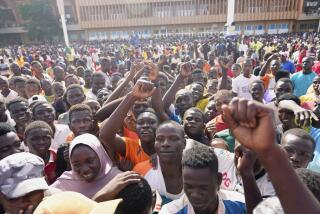Once Again, Nigeria Takes Tentative Steps Toward Democracy
LAGOS, Nigeria — The heavily armed soldiers had taken up their positions by 5 a.m., well in the vanguard of this busy capital’s morning-long commuter rush. Swiftly they secured all access roads to the federal election commission’s headquarters and occupied all of the bridges overlooking the building.
The scene last month might have resembled one of the frequent military coups that have afflicted this vast country since its independence in 1960. But this time the soldiers were deployed to safeguard an entirely different process.
Within hours, convoys of trucks began to roll past the sentries, carrying the tons of documents that are the raw material of Nigeria’s transition from military rule to democracy.
The event marked an important milestone in the procedure established by the country’s military regime to provide a democratically elected government by 1992. It was the deadline for Nigeria’s dozens of fledgling political groups to apply for recognition as an official political party, as the regime lifted a three-year nationwide ban on political activity.
Altogether, 13 associations registered, loading reams of petitions, resumes of their officials and proof that they had local offices throughout the country--25 copies of every page--into trucks and vans and carting them to the commission headquarters.
Two Parties to Be Chosen
From these 13, the military regime will soon select two to function as the legal political parties of Nigeria’s Third Republic. It is not the least-curious aspect of the experiment that the military has mandated a two-party state; once the two are chosen, the other 11 groups must disband.
A successful transition here may mark a watershed in African history. For it is rare enough that any African regime voluntarily hands over power to a successor--rarer indeed that a military government hands off to civilians.
Not only would Nigeria, with more than 120 million people, be the world’s third-largest democracy, after India and the United States, it would counter a baleful African trend: Multi-party democratic governments get snuffed out on this continent like candles in a gale.
Following July’s military overthrow of Sudan’s inept parliamentary government, only two countries in sub-Saharan Africa, Botswana and Senegal, are left with genuine multi-party systems. The rest of the map is occupied by one-party states, military regimes and dictatorships.
“If this succeeds in Nigeria, it will have a fantastic influence all over Africa,” says Alao Aka-Bashorun, president of the Nigerian Bar Assn. and a firm opponent of military rule.
There is some cause for optimism. For one thing, Nigeria’s military rulers do consider themselves guardians of the country’s democratic traditions. President Ibrahim B. Babangida, the leader of the last military coup in 1985 and the architect of the transition, proclaimed in a recent speech: “I am a democrat.”
“Most of the officers have been educated abroad, and Sandhurst did a good job,” observes a Western diplomat, referring to the British equivalent of West Point where many of today’s Nigerian military brass were presumably inculcated with democratic political values.
Any visitor must be struck by the sheer latitude, if not obstreperousness, permitted Nigeria’s press by the military government. Although the regime is not above throwing some vocal opponents in jail, more often dissent gets played out in court cases brought by or against dissidents, and which appear to progress according to reasonable judicial rules.
Yet the transition is undeniably colored by a deep mutual mistrust between politicians and the military brass. In large part, this is the legacy of the regularity with which the groups have alternated in power, as if participating in a two-party state of their own.
The army brass cherishes a view of its role as stepping in to correct the criminal excesses of civilian governments, an attitude exemplified by this blunt appraisal from Babangida in his recent speech:
“Why is it that our political parties tend to attract the idle and illiterate?” he asked.
Seeds of Failure
Because of the officers’ suspicion of civilians, this transition, like many other features of Nigerian life, is destined to unfold in a unique way. And therein may lie some seeds of failure.
For one thing, the revitalization of Nigeria’s civilian politics will take place without the participation of most of its civilian politicians: All previous office holders, going back to independence, are to be barred for life from politics.
If the military rulers have their way, it will also occur without the influence of the three factors that have given Nigerian politics its characteristic ferocity: tribalism, religion (that is, Muslims vs. Christians) and geography. For under the regime’s rules, no political association that reflects anything but multi-tribal, multi-religious and multi-regional support will have any chance of selection.
In particular, the two-party system is aimed at defusing Nigeria’s traditional three-cornered tribal structure of mutually belligerent Yoruba in the west, Ibo in the east and Hausa-Fulani in the north.
Nigerian Traditions
But the military leaders may have underestimated the difficulty of wiping Nigerian tradition out of Nigerian politics.
“Tribalism, religion, region, all these things are in the heart,” says Lateef Jakande, a former civilian governor of Lagos state and one of the most respected politicians in the country. “You cannot erase them with a decree.”
Vigorous political debate is scarcely likely to be fostered by the slow transition timetable. Once the two parties are selected, legislative elections will be held in December. While the civilians move gradually into government over the next two years, they will be firmly overseen by the military, which reserves the right to withdraw the registration of either new party if it violates the strictures against regional, religious or tribal support.
But it is the ban on former office holders that many Nigerians find most ill-advised.
With the country’s best-known public figures on the sidelines, including any with sufficient renown and regional support to unite the fractious country, Nigeria’s political future is in the hands of a collection of middle-level civil servants, retirees and businessmen who are nominally heading the political groups.
Marred by Corruption
Few Nigerians would deny that the country’s civilian politics were marred by corruption and fraud. But few doubt that the military regimes have displayed the same failings. More important, many here believe the disqualification of all previous office holders, honest and crooked alike, could generate even worse corruption.
Moreover, because the ban extends only to former office holders, it leaves backstage manipulators in place, not to mention the incompetent, the unpopular and the unlucky.
Most influential Nigerians do take the generals at their word that the transition will take place in 1992, although there has already been some delay in the timetable. The changeover was originally to occur in 1990, but 18 months ago, Babangida moved the date back by two years.
“He saw the country simply wasn’t ready,” says one experienced diplomat in Lagos. “The change was done at some political risk, but the general population believed he was right.”
Many people here are more uneasy over what might happen after 1992: How much time the military will allow a fledgling civilian government to find its own way, with whatever stumbling may occur, before taking over again.
History does not encourage optimism: The country has been led by generals for 18 of its 29 years of independence from Britain.
More to Read
Sign up for Essential California
The most important California stories and recommendations in your inbox every morning.
You may occasionally receive promotional content from the Los Angeles Times.










